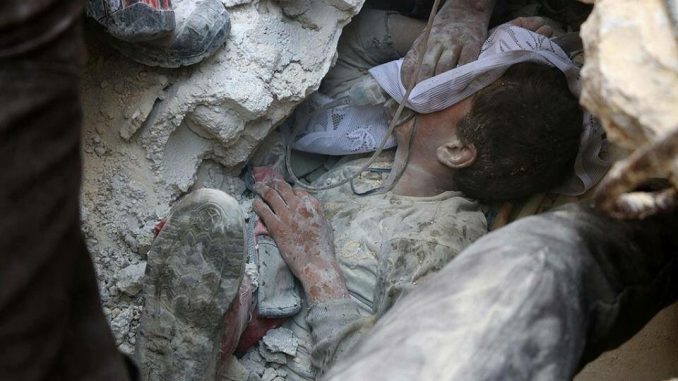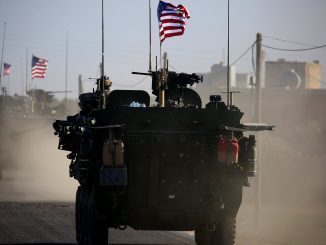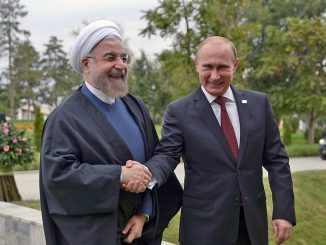
Russia and China on Monday vetoed a U.N. Security Council resolution that would have demanded a seven-day truce in Syria’s Aleppo, giving Assad regime a green light to exterminate 200.000 civilians trapped inside the remaining rebel-held parts in the city.
It was the sixth time Russia has vetoed a Security Council resolution on Syria since the conflict started in 2011 and the fifth time China has blocked action. Venezuela also voted against the text – drafted by New Zealand, Egypt and Spain – while Angola abstained. The remaining 11 states voted in favor.
“These kinds of pauses have been used by fighters to reinforce their ammunition and to strengthen their positions and this will only worsen the suffering of civilians,” Russian U.N. Ambassador Vitaly Churkin said of the proposed seven-day truce.
Churkin argued that action by the Security Council should be postponed to allow time for those talks.
Chinese U.N. Ambassador Liu Jieyi said the vote on the draft text should have been delayed to allow for more negotiations to reach council consensus and accused Rycroft of “poisoning” the atmosphere and “abusing” the forum with his remarks.
Russian Foreign Minister Sergei Lavrov said talks with the United States on the withdrawal of rebels would begin in Geneva on Tuesday evening or Wednesday morning. There was no immediate comment from Washington, which has backed some of the rebels.
“Those armed groups who refuse to leave eastern Aleppo will be considered to be terrorists,” Lavrov told a news conference. “We will treat them as such, as terrorists, as extremists and will support a Syrian army operation against those criminal squads.”
Western condemnation
The western diplomats have long condemned the offensive and asked to stop it, while not mentioning any real steps their countries are willing to do to make this happen.
Their reaction didn’t change after the Russian veto, saying “it was a tragedy”.
“That is a made-up alibi,” Deputy U.S. Ambassador to the United Nations Michele Sison told the council.
“We have not reached a breakthrough because Russia has been more focused on preserving its military gains than helping Aleppo’s citizens,” she said. “We will not let Russia string along this Security Council while waiting for a compromise from the Russians that never seems to come.”
British U.N. Ambassador Matthew Rycroft expressed surprise that China had joined Russia in vetoing the resolution, which would have also demanded humanitarian aid access and an end to the violence throughout Syria.
“(Russia and China) have chosen to veto not because of a lack of consultation, but because of their long-standing, misplaced faith in a despot who has killed nearly half a million of his own people,” Rycroft said.
New Zealand U.N. Ambassador Gerard van Bohemen said the failure to act was “deeply damaging to the council’s reputation and catastrophic for the people of Syria.”
Battle for Aleppo
The Russian intervention tilted the war in favor of Assad regime and cost the rebels many of their strongholds, making Aleppo one of the last ones and the most important pressure point on Assad regime to accept a political solution to end the war. However, Aleppo became under heavy fire and crippling siege since the start of this year
The Assad regime forces, backed by Russian air power, Iranian ground forces and Shi’ite militia fighters from Iran, Iraq, and Lebanon, has been tightening its grip on rebel-held districts of Aleppo since the start of this year.
Many ceasefire agreements accompanied by peace talks meetings were organized to help find a solution to the crisis, but Assad regime breached every ceasefire and hindered every peace talks meeting without any pressure moves or real steps from the western powers.
Assad regime forces started a major offensive to push opposition fighters out of the besieged eastern half of the city on 15 November.
Helicopters continue extensively dropping barrel bombs in conjunction with airstrikes by warplanes on areas in the eastern neighborhoods of the city, accompanied by artillery shelling by the regime forces in the same places.
The regime’s forces’ persistent and the intensive airstrikes forced the rebels to leave the areas they hold.
In just over a week, the rebels have lost most of the northern neighborhoods in besieged east Aleppo.
Around 30.000 thousands of civilians left their homes fleeing the extreme bombardment and the clashes in the eastern parts of Aleppo in the last days, while voices around the globe have been calling for an end of this blood bath.
U.N. envoy Staffan de Mistura said more than 100,000 people may still be in the rebel-held area. The Syrian Observatory for Human Rights, a Britain-based group that reports on the war, said it could be as many as 200,000 people.
Capturing eastern Aleppo would be the biggest victory for Assad regime since the start of the revolution against him in 2011, restoring his control over the whole city apart from a Kurdish-held area that has not fought against him.
It would also be seen as a victory for his allies, Russia and Iran, which have outmaneuvered the West and Assad’s regional enemies through direct military intervention.
For Assad regime, taking back Aleppo would make its forces focus on ending the remaining rebels-held areas. These areas include the rebels’ stronghold in Idlib in addition to isolated areas in rural Damascus, Homs, and Hama.
These areas have been under daily bombardment and crippling siege for years. The Old city of Homs and parts of rural Damascus has already been lost to Assad regime, and the remaining areas are expected to follow.
As a conclusion, defeating the rebels and retrieving Aleppo means destroying the last major resistance stronghold of the Syrian rebels and will lead eventually to the victory of Assad regime and ending the Syrian revolution.



